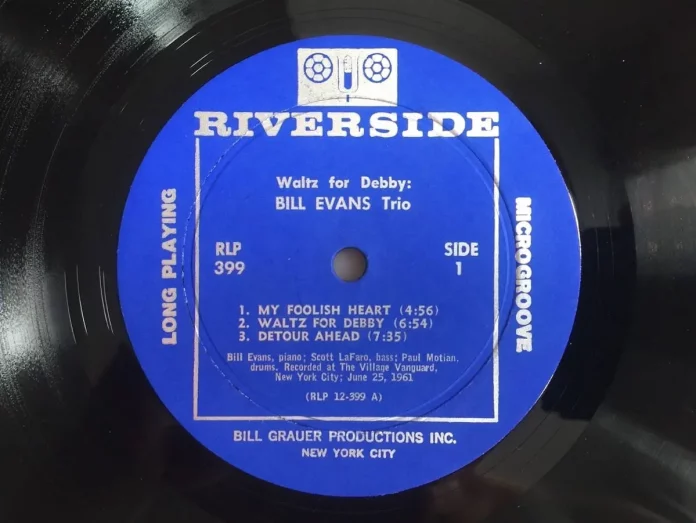In writing about one of Bill’s earlier releases I made the point that he dwelt too long on his ballads, and I still feel the same way. On the other hand I see that this can be a basic weakness of the LP system, where a whole session may be released on one record. It is just too bad if the performer felt in the mood to play ballads that day – after all, who ever took Bessie Smith apart for singing two blues back to back on a 78? Taking the broader aspect of Evans’ trio work to date, he has unquestionably made a play on the romantic side of his style, reserving the bigger rhythmic excursions for the band tracks with Miles Davis and others.
In detail the music presents a fascinating perspective of what must be one of the most creative minds in jazz today. His development of the ballad theme, “Foolish Heart”, is one of the most perfect I have heard, to the point where I have sat down and thought how other pianists might have improved on it. Then there is the title tune, “Debby”, which opens so sedately as a waltz. The trio weave it into various patterns, retaining an unusually strong melodic content, until the climax comes in LaFaro’s slightly more than wonderful bass solo. “Detour” is a slow, rather rambling piece where Bill seems to have them all groping for the time at one stage, probably intentionally. Again the bass work stands out as exceptional, and the complete understanding between the three can only be marvelled at.
An insight into Evans’ rhythmic approach is provided by his treatment of “My Romance”, a song he recorded first in 1956. Here LaFaro almost plays a guitar part, so high and fast does he pluck the strings of his bass. On a previous recording session Bill did a work-out on a Leonard Bernstein theme, and returns to the same composer for “Some Other Time”. To my mind he becomes too involved in the harmonic implications to make anything of this but the “pretty pretties” prove that he knows how to use the piano, and the block chords are always lurking in the background.
Mr. Evans may have taken a calculated risk when he decided to convey his impressions of “Milestones” as a finale, but it resolves itself into a simple musical tract, endowed with all the assets which he, the performer, thinks he does better than Miles, the composer. What the paying customer hears is an eloquent extension of a memorable jazz piece in modern concept, displayed in its two strongest dimensions by a pianist and bass player of such calibre that even the composer might come back for more.
Bill Evans deserves to be known, more especially as a musician’s musician, but not as a brash experimenter. He is shaping his style along lines conceived but never quite achieved by John Lewis, and devoid of the latter’s annoying preciousness.
Discography
My Foolish Heart; Waltz For Debby; Detour Ahead (19¼ min) – My Romance; Some Other Time; Milestones (19 min)
Bill Evans (p); Scott LaFaro (bs); Paul Motian (d). Village Vanguard, New York, 25th June, 1961.
(Riverside RLP 399 12inLP 39s. 8d.)
















